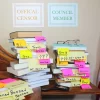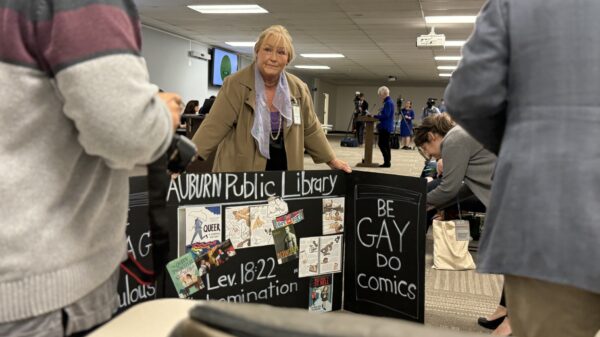“The Pronoun Book,” “Being You: A First Conversation About Gender,” “Yes! No! A First Conversation About Consent,” “Bye Bye Binary,” “Red: A Crayon’s Story”— all of these books were reviewed by the former Autauga-Prattville Public Library board and were found to be appropriately shelved, a decision meant to be ironclad for five years.
All of these books also appear on a new 113-book list crafted by APPL board Chair Ray Boles and Vice Chair Rachel Daniels—two of the three members of the bylaws and policies committee—and given to Library Director Andrew Foster with the request to move the books to the adult section and flag them for adult content.
In fact, every book formally challenged at the library appears on the list with the exception of the book “Red Hood” and all books by author Sarah J. Maas, as those books have already been moved out of the young adult section.
Boles and Daniels claim the books should be moved under sweeping changes the board made to its policies at its Feb. 8 meeting, most notably changing the selection criteria to state that “the library shall not purchase or otherwise acquire any material advertised for consumers ages 17 and under which contain content including, but not limited to, obscenity, sexual conduct, sexual intercourse, sexual orientation, gender identity, or gender discordance.”
APR obtained the book list under the Alabama Open Records Act, as well as written communications exchanged between Foster, library board members and library board attorney Laura Clark regarding the process.
In one such email, Foster explains to Boles that the list seems to include books that do not clearly violate the new policies, and predominantly targets LGBTQ+ books.
“Any clarification from the board on how this list was created and how/why the books on it were chosen would be appreciated so I can understand the guidelines used/intended,” Foster wrote in an email.
APR contacted Boles in an effort to learn more about how the list was created and for clarification, but Boles refused to answer questions.
“So I’ll tell you what: I’m not going to speak to you about anything about this because I consider y’all’s newspaper fake news,” Boles said before hanging up.
{{CODE1}}
Most books on the list have LGBTQ content, connections
Based on Foster’s review 95 out of 113 titles on the list, or 84 percent, were included for LGBTQ content, “though several of the LGBTQ connections are tenuous at best.”
“58 of those books (51%) seem to be included solely for LGBTQ content,” Foster said in an email.
One such book is “Over the Rainbow” by Rachael Davis, a juvenile book about the “science, magic and meaning of rainbows.” The book has a two-page spread about how the rainbow has been historically used to represent LGBTQ+ rights. The book also discusses the Biblical meaning of the rainbow symbol from the story of Noah’s Ark.
Another book that touches on the role of genders is David Levithan’s “Every Day” which contains very limited sexual content. However, one of the characters, “A” wakes up in the body of a different teen each day, and attempts to maintain a relationship with a girl they fall in love with. “A” has never inhabited a specific body for longer than a day, and therefore has no innate gender.
According to Foster, only 42 percent of the books, 48 title, have sexual content.
“The line I tried to draw for this was anything in the book beyond kissing, whether explicit or not,” Foster wrote. “As I’ve stated before, I need guidance in what qualifies as ‘sexual conduct’ as defined by the policy since that is a very broad spectrum.”
About half of the books flagged for sexual content also include LGBTQ content.
Emails reveal confusion over whether books are to be moved, or removed
Boles and Foster apparently met on March 4 to discuss Foster’s concerns about the list, based on multiple emails discussing such a meeting.
“Per are conversation yesterday I spoke to are attorney and she said you are wrong on your interpretation of our new policies and that we don’t have to vote on moving the books,” Boles said in a March 5 email. “How long will it take you to tag the books and get them in the adult section?”
“I’d like to ask some clarification on how my interpretation of the new policy is incorrect,” Foster responded. “I stated in our meeting that the changed policy states that ‘The Library Board of Trustees reserves the right to exercise discretion over all library material, including but not limited to books. . .”, which seems to be what comes into play here—that the library board is exercising that discretion regarding the list of books I was given to have them moved to adult sections due to the changed selection criteria. However, since that is a decision of the full library board, the board is required to make those decisions in an open meeting, per the Open Meetings Act.”
Boles asked Clark to respond to Foster’s question, and Clark told Foster by email that “books may be removed without a meeting of the board subject to the Open Records Act.”
“Book removal can be initiated the following ways,” Clark said. “1. At the request of a patron who went through the material reconsideration process. 2. Through the normal course of weeding. If it is done through the request of a patron who went through the material reconsideration process, then it must be done through a meeting and decision of the committee and the board subject to the Open Meetings Act. If it is done through the normal course of weeding, then a meeting is not required.
“In this case, you were asked by the board chairman to weed out books that violate the policy. You asked for examples. The Chairman advised you with a list of examples and asked you include them in your weeding out.”
Weeding refers to removing materials from the collection, not relocation. While weeding is the work of the librarian, the policy states that “the Library Board reserves the right to exercise discretion over weeding of materials.” The policy states that books “not aligned with the selection criteria” are “candidates for weeding.”
Clark’s email mischaracterizes Boles’ request based on multiple emails, minutes taken by Darr, and an APR interview with Darr.
The first piece of evidence that Boles requested moving, not weeding, the books has already been stated, when Boles said Clark’s opinion is that “we don’t have to vote on moving the books” and asks how long it will take to “get them in the adult section.”
Rough minutes from the Feb. 14 policy committee meeting in Foster’s office also notate that Boles asked Foster to move the books, not remove them.
“What is the timeline for moving the books,” the minutes note Boles asking.
Darr emphasized to APR Saturday that “We don’t plan on removing any books.”
“There’s a lot of this (talk) about that we’re banning books,” Darr said. “I don’t think any board member wants to remove books … We don’t plan to weed out books like that. We want to make them available, just not where someone can stumble into it.”
The subject line of Clark’s email to Foster is “RE: Open Meetings Act and book removal.”
Clark herself made a point last year as a resident raising opposition to the books that she and other parents wanted the books “moved, not removed.”
But in her email, Clark references the right of the board to exercise discretion over the collection, and said “they have done so here by enacting a policy that is to guide you as you weed out the books.”
Lori Lein, who served as general counsel for the Alabama League of Municipalities for more than 22 years before retiring in December, told APR that a policy that gives a board discretion “is just that, majority vote of the board.”
“Individuals can’t exercise that unless the board has somehow delegated that,” Lein said.
While the policy sets selection criteria as a factor to consideration when weeding materials, the policy does not require the weeding of any materials.
Jessica Hayes, advocacy coordinator for the Alabama Library Association, told APR after reviewing the public records that there appears to be confusion over “whether this is a relocation project or a removal project.”
“Those are vastly different things in professional librarianship,” Hayes said. “Ray Boles is treating this as a relocation project; that is not how Laura Clark is treating it based off these emails. Ray frequently uses the term ‘move’ and ‘tag’ which would make me consider it a relocation project. If it was a relocation project, a cautious board would take the conservative approach and discuss this in an open meeting where a vote would be held.”
Foster also expressed concerns about Clark’s opinion.
“Laura’s statement is entirely about the library’s weeding process which- by its very definition- is the outright removal of items from the library, not the process of moving books between different sections of the library,” Foster said. “If the materials in question were slated to be removed, the statement would make sense.”
A plain reading of the policies don’t authorize any board member to specifically flag books to be weeded, it merely states that books not aligning with selection criteria are candidates for weeding. The library director has broad discretion over the library’s collection and could remove books, and anyone could claim to the librarian that a book violates the policy. But an individual board member’s opinion that the book does not align with selection criteria does not, under the policy, give that board member any authority to initiate the weeding of that book.
Ultimately, the board would need to hold a vote in order to weed specific materials if the library director disagrees with the selection criteria.
Several of the listed books do not clearly violate policies
“There are 8 books that I need clarification for why they were included based on the research I’ve done this week, as they do not even seem to fit within the library policy unless it is taken in the broadest possible strokes,” Foster said.
“Red: A Crayon’s Story” is one such book, Foster said, a story about a blue crayon in a red wrapper that suffers an identity crisis as other crayons expect it to conform to expectations, but the crayon is freed when it realizes it has been blue all along. Author Michael Hall has said he drew from his experience dealing with dyslexia and the misunderstanding of others that he was “lazy” or “not too bright.”
“Yes! No! A First Conversation About Consent” also does not fall under the library’s new policies. The official challenger of the book in Prattville argued that it “is intended to teach children that they must consent to any behavior done to them, specifically sexual,” but later admits “the subject matter is not sexual.”
Both of the aforementioned books were challenged by members or associates of Clean Up Prattville, and both were reviewed by the APPL board. Board member Sandra Harvey laughed when the recommendation to move “Red: A Crayon’s Story” came up.
“Who would have a problem with this?” Harvey asked. One other challenged book, “Cut,” appears on the list without having any clear violation of policy.
“This book seems to be about self-harm, but that is not covered in the policies,” Foster told Boles in an email.
It appears that these books were included to be moved simply because they had been challenged by Clean Up Prattville, not because they countered the new policies. APR had planned to question Boles about the inclusion of these books, but as stated earlier, Boles declined to comment.
Another book apparently challenged for LGBTQ content, “A Storm of Horses” by Ruth Sanderson, actually has none in it.
“The best I can assume is that this was targeted because some believe that Rosa Bonheur may have been a lesbian, but that is not stated in the book,” Foster said.
Other books that Foster believes do not fall under the policy guidelines include “Darius the Great is not Okay,” “Everything After,” and “Everything You Ever Wanted to Know About Puberty … and Shouldn’t Learn on TikTok for Curious Girls.”
Another six books flagged for relocation or removal aren’t actually in the young adult section, but are instead in various sections intended for adults.















































